 Following the webinar on 23rd May with Victoria Stokes talking about an experiment in underplanting in conifers at Clocaenog Forest, a recording has now been made available on YouTube which you can view using this link.
Following the webinar on 23rd May with Victoria Stokes talking about an experiment in underplanting in conifers at Clocaenog Forest, a recording has now been made available on YouTube which you can view using this link.

 Following the webinar on 23rd May with Victoria Stokes talking about an experiment in underplanting in conifers at Clocaenog Forest, a recording has now been made available on YouTube which you can view using this link.
Following the webinar on 23rd May with Victoria Stokes talking about an experiment in underplanting in conifers at Clocaenog Forest, a recording has now been made available on YouTube which you can view using this link.

 CCFG will be hosting their next webinar – Underplanting of conifers in Britain – with Victoria Stokes – on Thursday 23rd May 2024 4-5pm.
CCFG will be hosting their next webinar – Underplanting of conifers in Britain – with Victoria Stokes – on Thursday 23rd May 2024 4-5pm.
Underplanting is a relatively little-used technique for establishing trees while avoiding the disadvantages of clearfelling and may become increasingly important where a change of species is desirable. This webinar will report results from an underplanting experiment in the long-running CCF trial area at Clocaenog Forest in North Wales. Survival and growth of five different conifer species planted under a mature Sitka spruce overstorey will be compared. Impacts of the subsequent thinning operations and the final overstorey removal on survival of the underplanted seedlings will be presented, and responses of the five species to the removal of the overstorey 9 years after planting will be examined. Some operational “lessons learned” will also be highlighted.
Victoria is a Senior Scientist in the Silviculture and Wood Properties Science Group at Forest Research. She has over 20 years’ experience in carrying out research on management of Britain’s forests to increase resilience to climate change and biotic threats, whilst maintaining productivity. She leads research on Upland Silviculture, focussing on management techniques which increase tree species diversity and stand age structure, such as Continuous Cover Forestry. She has contributed to many collaborative projects and is a Fellow of the Institute of Chartered Foresters.
To book your place please visit this link.
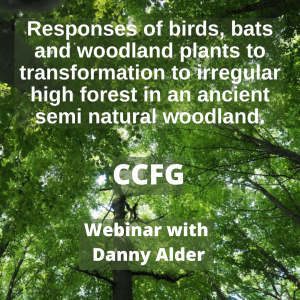
Following the webinar on 21st March with Danny Alder talking about the biodiversity research project on the Rushmore Estate on the Dorset-Wiltshire border looking at the responses of woodland birds, bats and woodland plants to different stand management, a recording has now been made available on YouTube which you can view using this link.
You can also watch Andy Poore’s talk on Applying CCF in Lowland Broadleaved Woods, which also refers to the Rushmore Estate, but was recorded in October 2021.
CCF G will be hosting their next webinar – Biodiversity responses to transformation to irregular high forest – with Danny Alder – on Thursday 21st March 2024 4-5pm.
G will be hosting their next webinar – Biodiversity responses to transformation to irregular high forest – with Danny Alder – on Thursday 21st March 2024 4-5pm.
Danny’s talk will be about the biodiversity research project on the Rushmore Estate on the Dorset-Wiltshire border looking at the responses of woodland birds, bats and woodland plants to different stand management with a particular focus on the introduction of irregular high forest management.
The forest manager at Rushmore is Andy Poore, a founder member of CCFG, who gave a webinar in 2021 – to watch Andy’s talk for more background on this site please see this link.
Understanding how biodiversity responds to changes in the management of woodlands can be helpful to forest managers, especially in woodlands with a high nature conservation value, and more generally where the aim of forest management is to work with natural processes towards sustainable management. In this study on the Rushmore Estate, in the Cranborne Chase National Landscape, different taxonomic groups were sampled across different stand types. These included 1) traditional coppice and coppice with standards, 2) limited intervention, stands where management had effectively stopped for at least 30 years, 3) Irregular high-forest; a single tree or small group selection system which had been introduced in the 1980’s, and 4) Transitional management where stands were at the early stages of transformation towards irregular high-forest, which had come out of production and were either over-stood coppice or pole-stage, closed canopy. To help understand the responses of the different taxonomic groups it was important to look at how the structure of the woodland varied and relate these structural characteristics to the different species encountered.
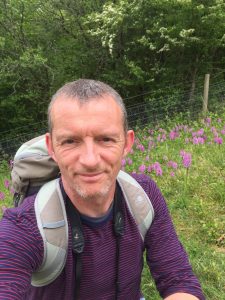
The talk will highlight the study methods and main findings, and will discuss the implications of the research which has produced three peer-reviewed papers in Forest Ecology and Management. A summary technical article is due to appear in the spring of 2024 in the Quarterly Journal of Forestry.
Dr Danny Alder undertook this research towards his PhD within the Natural Sciences department at Manchester Metropolitan University. Danny lives in Dorset and is an ecologist working in countryside management. He has a special interest in conservation ecology and research focusing on woodlands and their management.
To book your place please visit this link.
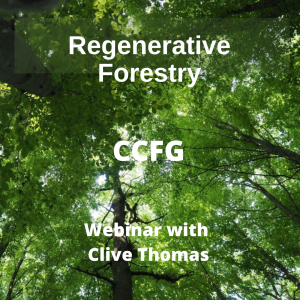
CCFG will be hosting their next webinar – Regenerative Forestry
with Clive Thomas, Wednesday 21st February 2024 4-5pm
This online event is hosted by CCFG featuring Clive Thomas who will deliver a 30 minute presentation on this topic. This will be followed by a question and answer session for participants.
Join this webinar to hear more and discuss the Soil Association’s Regenerative Forestry report. This report and supporting evidence was developed to inform advocacy for an approach to forestry in the UK founded on goals of integration, resilience, restoration, engagement and reward. Download the report ahead of the webinar to learn more.
Regenerative Forestry Report (soilassociation.org)
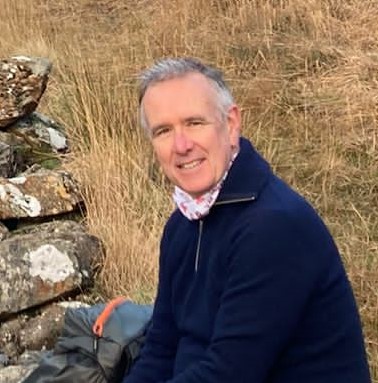
Clive Thomas is Soil Association’s senior adviser for forestry, leading on regenerative forestry including the integration of trees and woodland management into farming systems, as well as policy development in response to voluntary carbon and natural capital markets. Clive is a fellow of the Institute of Chartered Foresters and has worked in private and state forestry sectors during a 30+ year career managing forests and developing forest policy.
Continuous Cover Forestry Question Time – CCFQT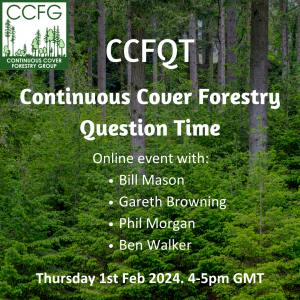
Please join us for our inaugural online CCF question time. Our Chair, Bill Mason, will be joined by a panel of foresters: Phil Morgan, Gareth Browning, and Ben Walker. The panel members will reply to questions about any aspect of CCF. The questions can either be provided in advance or posted during the session.
This is an experimental session; if it is successful we may hold more sessions in future.
Following the second webinar of the 2023-24 season on 23rd November, with Gary Kerr, a recording has now been made available on YouTube which you can view using this link.

CCFG will be hosting their next webinar – How can silvicultural systems help adapt forests to climate change?
with Gary Kerr, Thursday 23rd November 2023 4-5pm
This online event is hosted by CCFG featuring Gary Kerr who will deliver a 30 minute presentation on this topic. This will be followed by a question and answer session for participants.
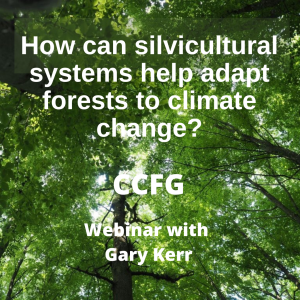 The talk will describe the main silvicultural systems we can use to manage forests and give a personal view about their application in Britain. In addition, the talk will give a summary of a the main risks to forests from climate change, the possible impacts and the evidence base for how the use of continuous cover can help mitigate these risks. Finally, the talk will consider how best to communicate ‘how to do continuous cover’ to new audiences. Along the way Gary will be asking the audience some questions, so have a paper and pen handy and be honest with yourself when the answers are revealed!
The talk will describe the main silvicultural systems we can use to manage forests and give a personal view about their application in Britain. In addition, the talk will give a summary of a the main risks to forests from climate change, the possible impacts and the evidence base for how the use of continuous cover can help mitigate these risks. Finally, the talk will consider how best to communicate ‘how to do continuous cover’ to new audiences. Along the way Gary will be asking the audience some questions, so have a paper and pen handy and be honest with yourself when the answers are revealed!
Gary was the Principal Silviculturist for Forest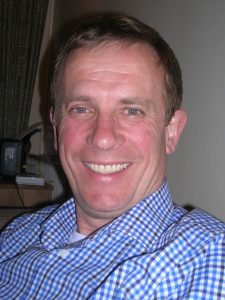 Research until September 23. The main thrust of his work has been applied silvicultural research and this has led to over 50 papers in peer reviewed journals, 16 Forestry Commission publications and over 50 articles in professional publications communicating the results of research. For the last ten years his work has focussed on alternative approaches to management and continuous cover silviculture. He was the Editor-in-Chief of Forestry: An International Journal of Forest Research, published by Oxford University Press for 20 years. After retiring from Forest Research he divides his time between working as the Commissioning Editor for the Quarterly Journal of Forestry, Chairing the Scientific Advisory Board of the European Forest Institute and continuing his association with FR as a Research Fellow.
Research until September 23. The main thrust of his work has been applied silvicultural research and this has led to over 50 papers in peer reviewed journals, 16 Forestry Commission publications and over 50 articles in professional publications communicating the results of research. For the last ten years his work has focussed on alternative approaches to management and continuous cover silviculture. He was the Editor-in-Chief of Forestry: An International Journal of Forest Research, published by Oxford University Press for 20 years. After retiring from Forest Research he divides his time between working as the Commissioning Editor for the Quarterly Journal of Forestry, Chairing the Scientific Advisory Board of the European Forest Institute and continuing his association with FR as a Research Fellow.
IF YOU WOULD LIKE TO ATTEND YOU CAN BOOK YOUR TICKET HERE
CCFG will be hosting their next webinar – Coppice, Carbon and Catastrophes: The Joy and Pain of Managing for CCF in Our Times
with Arne Pommerening, Thursday 26th October 2023 4-5pm
This online event is hosted by CCFG featuring Arne Pommerening who will deliver a 30 minute presentation on this topic. This will be followed by a question and answer session for participants.
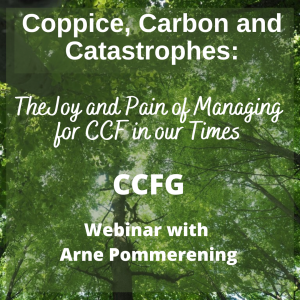 Continuous Cover Forestry (CCF), i.e. forest management based on ecological principles, has been introduced to Ireland and the UK more than twenty years ago. Whilst in the early days identifying simple and robust methods of transforming plantations to woodlands with more complex structures were the primary concern, ongoing climate change and the recent energy crisis have added new challenges of managing for CCF. Many policymakers including the authors of the recent EU forest strategy and of associated recommendations proposed by the European Forest Institute see CCF as a major instrument for mitigating adverse effects of climate change. In this context, carbon forestry has become a major buzzword and a research field in its own right, however, it is still largely unknown how exactly existing woodlands should be managed for optimising carbon sequestration. Questions like “Is carbon forestry part of or a concept separate from CCF?” or “Can carbon forestry be carried out along with other management objectives or is a special focus required?” are hotly debated. Ongoing climate change and all its localised realisations such as spontaneous gales, droughts, floods and insect calamities can always bring the sudden end to any CCF woodland that we have transformed for many years with great effort. In that situation we may be left with little more than bare ground and methods are needed to establish new CCF
Continuous Cover Forestry (CCF), i.e. forest management based on ecological principles, has been introduced to Ireland and the UK more than twenty years ago. Whilst in the early days identifying simple and robust methods of transforming plantations to woodlands with more complex structures were the primary concern, ongoing climate change and the recent energy crisis have added new challenges of managing for CCF. Many policymakers including the authors of the recent EU forest strategy and of associated recommendations proposed by the European Forest Institute see CCF as a major instrument for mitigating adverse effects of climate change. In this context, carbon forestry has become a major buzzword and a research field in its own right, however, it is still largely unknown how exactly existing woodlands should be managed for optimising carbon sequestration. Questions like “Is carbon forestry part of or a concept separate from CCF?” or “Can carbon forestry be carried out along with other management objectives or is a special focus required?” are hotly debated. Ongoing climate change and all its localised realisations such as spontaneous gales, droughts, floods and insect calamities can always bring the sudden end to any CCF woodland that we have transformed for many years with great effort. In that situation we may be left with little more than bare ground and methods are needed to establish new CCF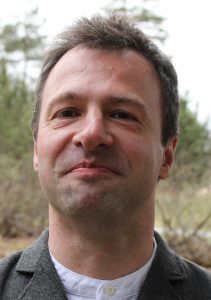 woodlands from scratch. CCF from scratch may also include the use of coppice systems, particularly the use of coppice with standards and coppice selection systems. Such system can contribute to satisfying the current demand for sustainable energy whilst creating diverse habitats and providing high-quality timber at the same time.
woodlands from scratch. CCF from scratch may also include the use of coppice systems, particularly the use of coppice with standards and coppice selection systems. Such system can contribute to satisfying the current demand for sustainable energy whilst creating diverse habitats and providing high-quality timber at the same time.
Arne Pommerening is a professor at the Department of Forest Ecology and Management of the Swedish University of Agricultural Sciences (SLU) at Umeå in Northern Sweden. For more than 20 years he has taught CCF to university classes in the UK, Switzerland and Sweden. Whilst working at Bangor University in Wales between 2000 and 2011, he contributed to the introduction of CCF in the UK and offered seminars in Ireland. Arne has recently published a textbook entitled “Continuous Cover Forestry – Theories, Concepts and Implementation” and he is currently involved in the introduction of CCF to Sweden.
IF YOU WOULD LIKE TO ATTEND YOU CAN BOOK YOUR TICKET HERE
Following the last webinar of the 2022-23 season, which was well attended on 29th June with up to 80 people participating, a recording has now been made available on YouTube which you can view using this link.
Dr Andrew Cameron, who presented it, has also made available the references he used at the end of the presentation, which you can view here.
For those wishing to go into full detail, the chat file from the Zoom meeting is also available here. As a note, Charlie Taylor was a forester on the Tay District for many years and was involved in the management, while Andrew Cameron and Aberdeen University were carrying out the experiment.
